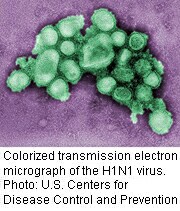
WEDNESDAY, June 16 (HealthDay News) — The H1N1 influenza vaccine distributed in 2009 also appears to protect against the 1918 Spanish influenza virus killed more than 50 million people nearly a century ago, new research in mice reveals.
The finding stems from work funded by the U.S. National Institute of Allergy and Infectious Diseases, part of the National Institutes of Health, which examined the vaccine’s efficacy in influenza protection among mice.
“While the reconstruction of the formerly extinct Spanish influenza virus was important in helping study other pandemic viruses, it raised some concerns about an accidental lab release or its use as a bioterrorist agent,” study author Adolfo Garcia-Sastre, a professor of microbiology at the Mount Sinai School of Medicine in New York City, said in a school news release. “Our research shows that the 2009 H1N1 influenza vaccine protects against the Spanish influenza virus, an important breakthrough in preventing another devastating pandemic like 1918.”
Garcia-Sastre and his colleagues report their findings in the current issue of Nature Communications.
The authors worked with three groups of mice, injecting them with either the 2009 H1N1 influenza vaccine, a seasonal influenza vaccine, or no vaccine.
Three weeks following vaccination, all the mice were exposed to a deadly dosage of the 1918 Spanish influenza virus. The researchers observed that only mice from the group that had been inoculated with the 2009 H1N1 vaccine were able to survive, although some from that group also succumbed to the Spanish influenza exposure.
In a second round of testing, Garcia-Sastre’s team also injected mice with blood serum drawn from people who had been vaccinated against H1N1, and then exposed them to the Spanish influenza virus. In this way, the researchers found that antibodies present in human blood exposed to the H1N1 vaccine may also offer some protection against Spanish influenza.
“Considering the millions of people who have already been vaccinated against 2009 H1N1 influenza, cross-protection against the 1918 influenza virus may be widespread,” said Garcia-Sastre. “Our research indicates that people who were exposed to the virus may also be protected. We look forward to conducting further research on the benefits of the 2009 H1N1 influenza vaccine in protecting against the deadly 1918 Spanish influenza virus.”
More information
Find out more about the 1918 flu epidemic from Stanford University.

